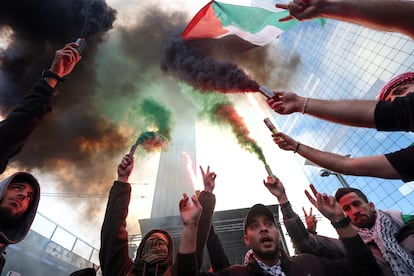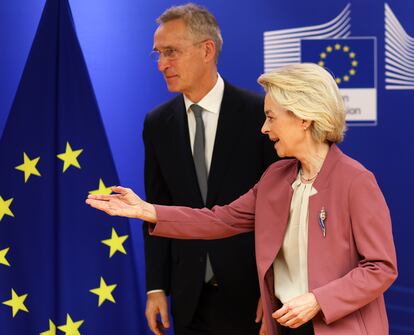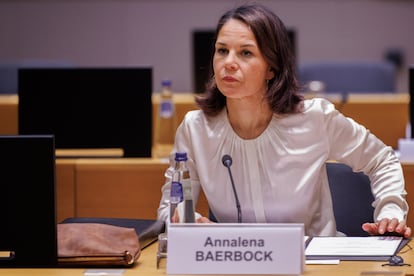EU seeks solutions for the day after Israel leaves Gaza
The need to establish a roadmap for the management of the Strip after the conflict is making its way into a still incipient debate

As the crisis in the Gaza Strip, besieged and bombed by Israel in response to the Hamas attack of October 7, rages, the European Union is beginning to think about the day after the conflict. Member states and EU institutions have begun a process of reflection on possible solutions for the Strip following the end of the war. In the long term they all agree on the two-state solution, but they are also discussing possible shorter term, immediate measures to guarantee the security and rights of both Israelis and Palestinians once the Israeli army withdraws. Germany, for example, suggested a few weeks ago placing Gaza under the international protection of the United Nations. The EU’s High Representative for Foreign Policy, Josep Borrell, speaks of a Palestinian authority defined and decided by the U.N. Security Council, with the support of the Arab countries.
What is clear to both the EU and the United States is that Israel cannot reoccupy Gaza once its war with Hamas is over. This was underlined by Borrell on Monday, shortly before he embarked on a trip to Israel that will also include a visit to the Palestinian city of Ramallah. Meanwhile, President of the European Commission Ursula von der Leyen will head to Egypt and Jordan. In Borrell’s case, this will be his first trip to Israel since he was appointed as the EU’s chief diplomat. It will also be the first time since the outbreak of the conflict that a senior EU official will visit the West Bank after setting foot on Israeli territory.
In Borrell’s opinion, Israel cannot remain in Gaza after the war, but “a Palestinian authority must return to Gaza.” The high representative stressed that he was referring to “a Palestinian authority, not the Palestinian Authority.” “It is understandable that the Palestinian Authority [which rules in the West Bank] does not want to enter Gaza on top of an Israeli tank,” Borrell added.
The panorama for Gaza is one of the great debates the European Union and the United States want to initiate now. And in this future perspective, the Palestinian Authority can play a role in the management of the Strip, they agree. But to do so, it needs internal reforms, greater capacity, and wider international support. U.S. Secretary of State Antony Blinken has spoken of an “effective and revitalized Palestinian Authority” that should ultimately govern Gaza. Israel is opposed to the idea.
The debate is still at a very preliminary stage and many agree that, in the short term, a transitional authority is likely to be the solution. Both the EU — which has been losing influence in the region — and Washington also believe that the Arab countries in the area should be given a voice in the matter. Above all, there is the question of what Gazans want their future to be in a territory that has been razed to the ground.
Last week, Blinken acknowledged that “a transition period at the end of the conflict” may be necessary, but he was also very explicit in refusing to allow Israel to remain in the territory: “It is clear that Israel cannot occupy Gaza”. Israeli Prime Minister Benjamin Netanyahu had earlier stated in an interview with U.S. television that Israel would assume “overall responsibility for security” in Gaza “for an indefinite period.”

Peace conference
The future of Gaza must be part of the path of dialogue to bring the conflict to an end, Washington and Brussels agree. The EU plans to hold a peace conference when the situation is less volatile and has begun to think about reconstruction. In the meantime, as Borrell suggested Monday, everything points to a possible road map that always leads to the two-state solution, a formula included in the international pacts that had been paralyzed as just another diplomatic linguistic tagline, but which is now back on the table.
Von der Leyen, for example, has proposed what she called “five basic principles” for the future of the Strip based on the prospect of a two-state solution; they presuppose both the end of Hamas rule in Gaza and the absence of Israeli security forces in the long term. The debate is there, but so are more urgent diplomatic moves such as making the “humanitarian pauses” called for by Washington and Brussels to allow aid to reach besieged Gaza effective. Following the Hamas attacks of October 7, Israel’s air raids and ground operation in Gaza have killed more than 11,300 Palestinians, according to figures provided by the Hamas-run Gazan authorities, including more than 4,500 children.
The German proposal to place Gaza under United Nations protection is contained in a document, advanced by the daily Politico, in which Berlin puts forward five different scenarios for the future of the Strip, including Israeli reoccupation and takeover by the Palestinian Authority or Egypt. The U.N. intervention is described as an “internationalization of Gaza under the umbrella of the United Nations (and regional partners)” with “a carefully organized transition” toward Palestinian self-administration, “ideally” through elections “and in combination with an international coalition that provides necessary security.” The two-page report, however, was drafted on October 21 and therefore came before the second phase of the Israeli military operation in Gaza and is now somewhat dated, according to several diplomatic sources.

A “clear course” for Gaza
In public, the official position of German Foreign Minister Annalena Baerbock is the one she expressed on November 8 in a communiqué following the meeting with her G-7 counterparts. Berlin speaks of the two-state solution and of setting “a clear course” for Gaza, which must meet several assumptions: the Strip must not pose a terrorist threat to Israel’s security in the future, Palestinians must not be expelled, and the enclave’s territory must not be reduced under any circumstances. Baerbock has so far been vague about the kind of immediate solution Germany would advocate, except for stating “Gaza should not be occupied, but ideally placed under international protection,” without providing further details as to the kind of protection she was referring to.
For Berlin the most relevant issue now is “Israel is defending itself from Hamas terror,” although it recognizes that “the humanitarian situation in Gaza is terrible, catastrophic, and must be addressed,” according to a foreign ministry spokesman. The German perspective “can only be a long-term two-state solution,” he added, noting that “everyone” is clear that it is the only possible answer to the crisis.
Sign up for our weekly newsletter to get more English-language news coverage from EL PAÍS USA Edition
Tu suscripción se está usando en otro dispositivo
¿Quieres añadir otro usuario a tu suscripción?
Si continúas leyendo en este dispositivo, no se podrá leer en el otro.
FlechaTu suscripción se está usando en otro dispositivo y solo puedes acceder a EL PAÍS desde un dispositivo a la vez.
Si quieres compartir tu cuenta, cambia tu suscripción a la modalidad Premium, así podrás añadir otro usuario. Cada uno accederá con su propia cuenta de email, lo que os permitirá personalizar vuestra experiencia en EL PAÍS.
¿Tienes una suscripción de empresa? Accede aquí para contratar más cuentas.
En el caso de no saber quién está usando tu cuenta, te recomendamos cambiar tu contraseña aquí.
Si decides continuar compartiendo tu cuenta, este mensaje se mostrará en tu dispositivo y en el de la otra persona que está usando tu cuenta de forma indefinida, afectando a tu experiencia de lectura. Puedes consultar aquí los términos y condiciones de la suscripción digital.








































